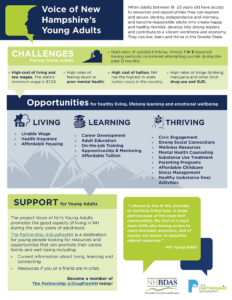Factsheets & Materials
We understand that sometimes print materials are the most convenient way to share information.
Below is a catalog of our current factsheets, collated by content and then audience. You can easily download, co-brand, print, and share these factsheets in your community.
If you don’t find what you are looking for, contact us. We are always open to suggestions and want to know what is needed in New Hampshire communities.
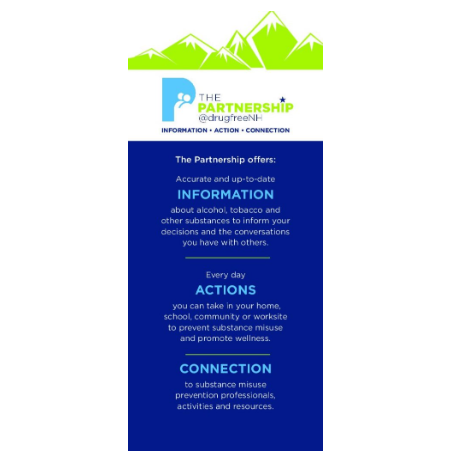
Download The Partnership @drugfreeNH’s Rack Card
Use this rack card to spread the word about The Partnership’s Information, Action, and Connection resources available to support your efforts to prevent substance misuse and promote wellness in your family, community, school, or worksite.
Access factsheets and materials for:
Cannabis | Opioids and Fentanyl | Methamphetamine and Stimulants | Tobacco and Vaping | Alcohol | Youth | Prevention Communication
Important Note: The Partnership uses the term cannabis to refer to the plant and all types of derived products such as—vape cartridges, edibles, smokable “weed” or “pot”, oils and tinctures. We are not using the term marijuana on most of our resources because this term has a complicated past that was slanderous towards certain people. It is, however, important that the language we use in some instances is accessible to the audience that we are trying to reach and we understand that marijuana is a commonly utilized term for products that contain the form of THC (Delta 9) that provides a euphoric affect or intoxication.

Spotlight Factsheet: General Facts About Cannabis Use
Cannabis is the most commonly used addictive drug, after tobacco and alcohol, and one of the most misunderstood. This factsheet provides science-based facts, not bias or hype, about cannabis.

Spotlight Factsheet: Cannabis Use and Young People: What Parents and Caregivers Can Do
As a parent or caregiver, your opinion shapes your child’s attitude and beliefs about cannabis use. This factsheet explains why cannabis is such a popular substance among youth and offers ways you can help your child avoid problematic use.

Spotlight Factsheet: Cannabis Use While Pregnant and Breastfeeding
Whether you use therapeutic or recreational cannabis, there are few things you should know about cannabis use during pregnancy and while breastfeeding. This factsheet provides a balanced perspective on what we know and don’t know about cannabis use during this special time, so you can decide what’s right for you.

Accidental overdose can happen to anyone taking a drug, but it doesn’t have to be fatal. This factsheet provides information about Fentanyl test strips (FTS) and naloxone (Narcan™) and where to get them. These lifesaving tools can protect people from unintentional fentanyl poisoning, overdose, and death.

Spotlight Factsheet: Strategies to Prevent an Accidental Overdose
Accidental overdose can happen to anyone taking an opioid, but it doesn’t have to be fatal. This factsheet provides ways to prepare for and respond to an overdose emergency.
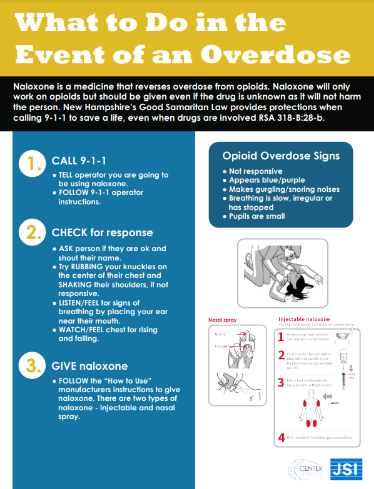
Partner Factsheet: What to Do in the Event of an Overdose – Opioid Overdose Rescue Guide
The rescue guide provides the latest recommendations on how to safely respond to an opioid overdose using naloxone (both nasal and injectable) and rescue breathing.

Spotlight Factsheet: Strategies to Avoid Opioid Misuse
If you or someone you know takes pain medication or opioids (with or without a prescription), learn how to keep them safe. This factsheet provides proven prevention resources on developing a safety plan for your family, guarding all your medications for safe use, storage and disposal and conversation starters for talking with your child.

There is rising concern about the access to and use of methamphetamine. It is manufactured to look like a common prescription medication used to treat ADHD. This factsheet spotlights important facts about this emerging trend so you can make the informed decisions around health and safety.

This factsheet spotlights facts about the misuse of prescription stimulants, current concerns about methamphetamine use, and helpful strategies to engage your children in a conversation.

Information and resources for healthcare providers to link patients to effective treatment, harm reduction strategies and support.

Spotlight Factsheet: Helping You Reduce the Harm with Methamphetamine
Practical ways for you and others to stay healthy and safe while using methamphetamine and stimulants.

Youth vaping (or e-cigarette use) which leads to nicotine dependence is a public health crisis. Parents, caregivers and schools are overwhelmed with how to respond. This factsheet explains why vaping is so popular among youth and how you can make a difference.

Tobacco use is an obstacle for people living with behavioral health issues (mental health and substance use disorders). When mental health centers and their staff make tobacco treatment part of their routine clinical approach by offering counseling and medications, they increase a patient’s chances for quitting. This factsheet explains why it is important to address nicotine dependence during treatment.

Order Printed Tobacco Prevention and Cessation Materials
Materials are available for your school, center, health care practice or other organization to promote the Save Your Breath youth vaping prevention campaign and the no-cost services of QuitNow-NH for NH adults, and My Life, My Quit for teen quit vaping services. Complete our order form to request free materials on preventing and quitting tobacco and vaping.

Information is key to helping to guide and inform conversations about alcohol. Use this fact sheet to gather information on risks related to drinking and the ways in which these risks can be addressed.

Alcohol is everywhere in American society, yet research shows that the longer youth wait before starting to drink the less likely they will struggle with substance use-related issues later in life. Learn how to talk to the youth in your life about alcohol and strategies to create a meaningful and productive conversation.
Video Discussion Guide: Connection – Strong Relationships Prevention Substance Misuse
Real NH youth tell us like it is. They know what works to prevent problems with alcohol, tobacco, and other substances and how to build developmental assets. Continue this conversation in your community. Download the video discussion guide for ways to spread the word about this important information about protective factors and developmental assets.

Spotlight Factsheet: Building Connections: Tips for Caring Adults
Connection and healthy relationships promote mental health and prevent substance misuse. There are everyday things we can do at home, in schools, and in our community to build connections with the young people in our lives that can make all the difference.

Spotlight Factsheet: Talking to Adolescents: Tips for Caring Adults
Open communication is the foundation for healthy relationships. It can be difficult with adolescents at times, though. You are not alone. Here are some tips for caring adults to nurture open lines of communication, as well as links to additional resources.
2019 NH Young Adult Needs Assessment Infographic
To better understand the root causes of substance use and mental health problems among NH’s young adults, a statewide assessment was conducted in 2019. A total of 2,694 adults aged 18-30 across the state, described what excites and what frustrates them about living, learning, and thriving in NH, and where they could use a little extra support.
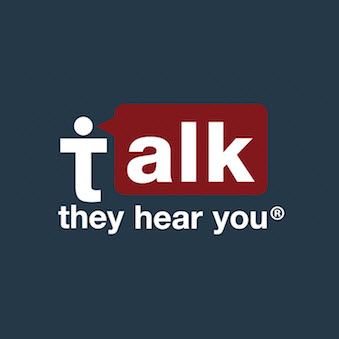
“Talk. They Hear You” Parent & Caregiver Resources
Check out these “Talk. They Hear You.”® campaign resources to help you start—and keep up—the conversation about the dangers of drinking alcohol and using other drugs at a young age.
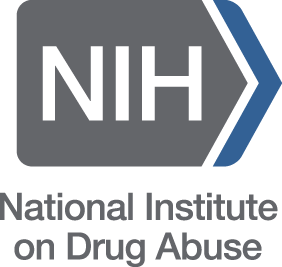
National Institute on Drug Abuse – Resources for Parents and Caregivers
Find the latest science-based information about drug use, health, and the developing brain. Designed for young people and those who influence them—parents, guardians, teachers, and other educators—these resources inspire learning and encourage critical thinking so teens can make informed decisions about drug use and their health.
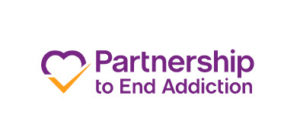
A comprehensive and up-to-date source of drug information for parents. Learn the facts, prevalence and warning signs to help keep your child safe.

Order Printed Perinatal Health Materials
Materials are available for your health care practice or other organization to promote the Today is For Me. campaign for people planning to become pregnant, people who are pregnant, and people who are in their postpartum period. Complete our order form to request free materials on perinatal health and the effects of alcohol, marijuana, and tobacco use.

